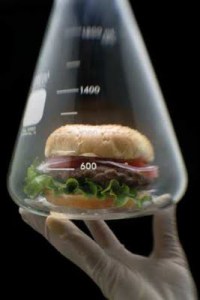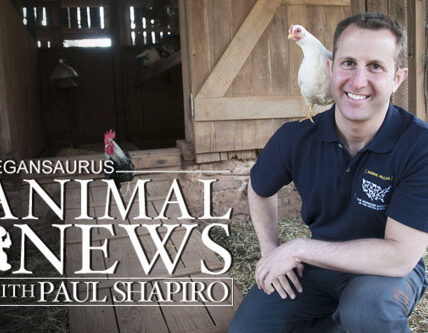Vegangstaz –
It is looking increasingly likely that the first fake meat could be on our plates within the next couple of years. Scientists are being driven to create commercially viable artificial meat by 30th June 2012 due to a cash prize of $1 million being offered by PETA.
The rules for this are simple. The meat must be a chicken substitute, and must be created in vitro (essentially this must literally be chicken meat grown in a test tube). The ‘meat’ must be grown in a quantity that is sufficient to be commercially viable and can be sold at a reasonable price in at least ten US states.
The taste must also be indistinguishable from real chicken, and a panel of PETA judges will be putting it through a taste test. The creation of a competitive in vitro meat will, hopefully, do a huge service to animals which are grown for food.
I say ‘hopefully’ because it concerns me that there is already a stigma against vegetarian meats, and I somehow doubt that in vitro meat will tackle this. Sure, I can see why omnivores may not enjoy tofu or Quorn (which has released its first vegan burger in the US), but well made seitan is pretty close to meat – I know I’ve had to double-check sometimes.
I’ve given some of my omnivorous friends seitan before and they’ve loved it. Yet they wouldn’t buy it over meat. Why? Because it’s ‘unnatural and weird.’ As a vegan, I can’t see what’s weirder than preferring animal flesh to a grain-based protein, but the point stands. And I think both vegans and omnivores alike will unfortunately view in vitro meat as weird and gross. I therefore worry that animal suffering will not necessarily be lessened significantly by the creation of in vitro meat.
However, I am possibly just being cynical, there is probably a market out there (perhaps meat-craving vegan coeliacs?), I just think PETA may be optimistic about its size. The other possible benefit lies in the ability to cheaply mass produce meat for the growing population of the world with a potentially far smaller CO2 footprint than factory farming. Sadly, however, this is not mentioned in the remit for obtaining the prize of $1 million, and I believe it should have been one of the key points. There is little point in creating in vitro meat if the environmental damage is equivalent to or even worse than factory farmed meat – we are yet to see the environmental effects of test tube meat.
We shall have to see what can be offered up before we can really assess the benefit of in meatro. Dutch scientist, Mark Post, has already created small pieces of beef, and is looking to develop the first in vitro beef burger by the end of the year. This excludes him from PETA’s prize, as chicken is required, but nevertheless Post is allegedly getting fairly close to creating the first test tube burger.

Mark Post is looking to create the first test tube burger by the end of the year
Post has also been heavily support by both the Dutch government (which is definitely a pleasant surprise) and an anonymous donor of €250,000. The donor said that they were motivated by ‘care for the environment, food for the world, and interest in life-transforming technologies.’
Another team in the Netherlands are experimenting with stem cells from animal embryos. They are making slow progress, with Bernard Roelen, a team member, stating that their results could be ‘a decade away’ and that they ‘need research money.’
This has been echoed by Professor Julie Gold, who is also working on a similar project in Sweden. She stated that ‘there is very little funding – what it needs is a crazy rich person.’
Vladimir Mironov, an ex-employee of NASA, has also managed to create pieces of test-tube animal tissue. His current problem is that the tissue is tasteless, lacking in texture, and is simply not very authentic. However, he is excited by the prospect of being able to grow ‘any animal’s tissue’ using in vitro, and even ‘milk, cheese, and eggs.’
Whilst it is looking unlikely that any of these scientists will manage to obtain PETA’s prize, in vitro meat could potentially be a normality in the future if it is done right (and I believe marketing it correctly will play a big part). PETA’s pot of money could actually be relatively insignificant if the products are successful, considering the market for animal products is vast.
However, you may be reading this with a few concerns about the in meatro race. I know I have a few.
Firstly, these products will rely on meat grown from stem cells. Now, whilst the degree of animal suffering is drastically reduced by using stem cells to grow meat rather than taking meat from a live animal, the stem cells themselves must be taken from an animal in the first place. In this regard, lab grown meat is still meat in its essence – it is still an animal product. As a vegan, someone who, by definition, does not consume or use animal products, I still find the use of animal stem cells to be ethically negative.
Secondly, as far as I’m concerned there are three major reasons for going vegan. For me, they are in this order:
- Limiting animal suffering.
- Protecting the environment.
- Benefitting my own health.
So, by eating in vitro meat you…
- Will drastically lower animal suffering compared to meat consumption (although, as discussed above, perhaps not avoid it completely).
- Will hopefully limit harm done to the environment (although, as discussed earlier, we cannot be sure about this yet).
- Will not benefit your health.
Meat in the diet is not a good thing, and with in vitro meat comes all the negatives of animal flesh itself – cholesterol, saturated fat, acidity. In fact, with this breakthrough creating the possibility of feeding meat to parts of the world which currently do not eat much animal protein, we are introducing a potentially negative force. As The China Study observed, we could essentially introduce cultures which lack meat in their diet to a host of problems. Similarly, vegans who choose to eat in vitro meat could also be losing one of the major reasons (and for some the major reason) for actually following the diet.
BUT! And this is a big, or potentially huge but…
Patrick Brown and a team at Stanford University, and another team based in Germany, are currently busy perfecting an artificial meat out of vegetable proteins. This is not entirely dissimilar from seitan, but wheat is not the primary ingredient.
And before you start thinking ‘oh great, another fake meat product…’ this is set to be different. Allegedly, the prototypes created so far have mirrored meat for taste, texture, and nutrition. Whether it will be more successful than seitan at converting omnivores could rely on these factors.
Patrick Brown states ‘we have a class of products that totally rocks, and cannot be distinguished from the animal-based product it replaces, even by hardcore foodies.’
Brown has also been through the process of growing stem-cell meat in a lab, but found the cost barrier to be too high to overcome. Mark Post has even shown support for this work, despite essentially competing against Brown. He has said ‘I think we agree on if there is a vegetable-derived product that can take away the craving of a human being for meat, then that would be preferable.’
Dr Patrick Brown discusses the need for cheap meat alternatives to sway consumers towards a vegan diet:
Meanwhile, Florian Wild of the German team has stated that a factory is now up and running to create 150 pounds an hour of this stuff. She has stated ‘our goal is to develop a vegetable surrogate for meat that is both juicy and fibrous, but that also has a pleasant flavor. The product should have a long shelf life, it should not be more expensive than meat, and be suitable for vegetarians and allergy sufferers.’
The German team will be demoing their product at the end of this month in Cologne, at the Anuga FoodTec trade fair. Needless to say, it should be on the market soon.
Little is known about the method outside of those working on this process, but it involves boiling plant proteins at a high temperature, and then allowing them to cool. During cooling they will bond to create a meat-like substance.
What’s most exciting for me about these products is not just the taste aspect, but the dedication the teams have actually shown to the vegan cause.
Patrick Brown actually decided to dedicate his life to the issue of creating a vegan meat a few years back. He has described animal farming as ‘by far the biggest environmental catastrophe.’
Whilst PETA’s prize is attractive and has caused a number of scientists to work towards creating lab grown meat, Patrick Brown is working on creating a viable meat alternative because it is important to him and his values. To dedicate your scientific career to creating such a product shows a sense of integrity, and whilst it looks like PETA’s prize may not actually go claimed this year, I look forward to sitting down and tucking in to the authentic vegan meat created by the authentic vegan dude, rather than the lab grown piece of cow grown by the new millionaire scientist.
Still, what’s your thoughts? Would you eat lab-grown meat? Or perhaps you’re someone who detests the taste of meat anyway? And will this new vegan faux meat please vegans and omnivores?
![]()
(c) Vegangstaz – Read entire story here.













